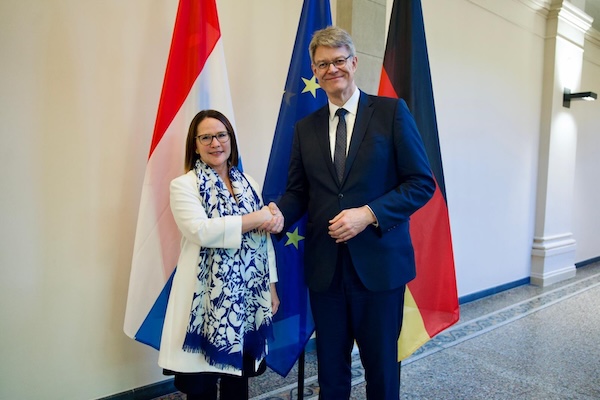 (L-R) Yuriko Backes, Luxembourg Minister of Mobility and Public Works; Patrick Schnieder, German Federal Minister of Transport;
Credit: MMTP
(L-R) Yuriko Backes, Luxembourg Minister of Mobility and Public Works; Patrick Schnieder, German Federal Minister of Transport;
Credit: MMTP
On Wednesday 19 November 2025, Luxembourg’s Minister for Mobility and Public Works, Yuriko Backes, met in Berlin with Patrick Schnieder, German Federal Minister of Transport, for their first bilateral meeting, devoted mainly to cross-border road, rail and river transport.
According to the Luxembourg Ministry of Mobility and Public Works, during the working meeting, the minister welcomed Germany’s commitment to the renovation and extension of the Eifel railway line (Eifelstrecke) and announced the imminent completion of a feasibility study for a direct Luxembourg–Mannheim connection via Saarbrücken, which would significantly improve cross-border mobility for the Luxembourg population and for cross-border workers.
In the same context, the minister highlighted the importance for Luxembourg of better access to the A64 to ease pressure on roads in the Moselle valley. In the area of inland waterway transport, the minister emphasised the importance of progressing with the work to duplicate the locks on the Moselle.
Moreover, the two ministers stressed the need to move forward jointly on strategic issues, such as autonomous driving, in order to harmonise the European regulatory framework.
The ministry noted that prior to the meeting, Minister Backes exchanged instruments of ratification concerning the amendment to the Moselle Treaty with her German counterpart and with the French ambassador to Berlin, François Delattre, who represented the Minister of Transport, Philippe Tabarot, on this occasion. The most significant amendment concerns the permanent abolition of the navigation charges levied since the inauguration of the major Moselle waterway in 1964.
Minister Backes stated: “Today is an important day for European inland navigation and, in particular, for Luxembourg inland navigation. The abolition of these charges results in substantial financial relief for river transport and offers new prospects for growth, investment and attractiveness for freight transport, as well as for the tri-modal port of Mertert which, as a strategic logistics hub, plays a decisive role in the supply chains of the energy and steel sectors.”








